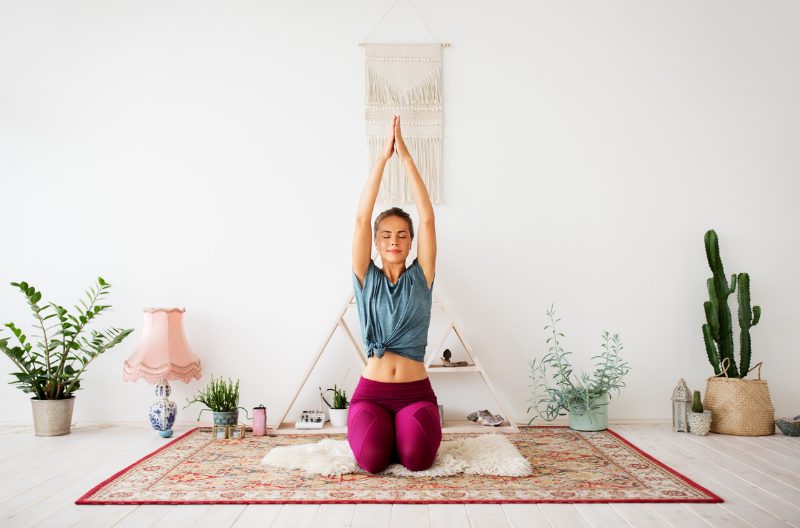Looking to find your inner peace and boost your health? Kundalini yoga could be the answer you’ve been searching for. It is more than a mere tier within yoga practice – it’s a way of life. If you’ve never heard of it before, you’ve come to the right place. Let’s take a look at a Kundalini yoga definition, its history, and why you should try it for yourself.
What is Kundalini & Kundalini Yoga?
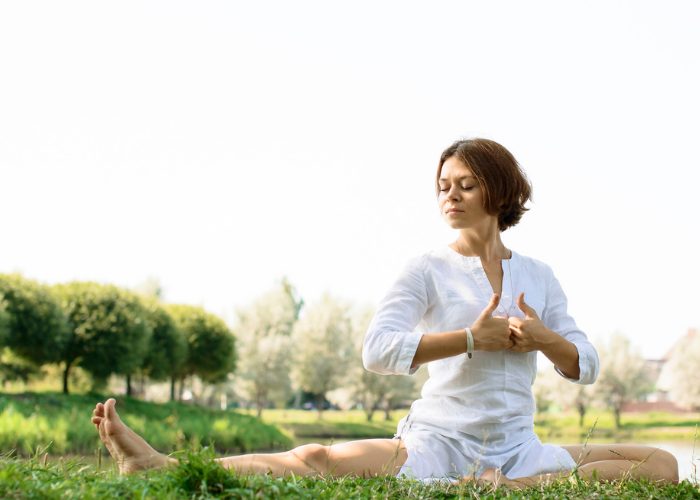
Let’s start with the basics. What is Kundalini yoga? First brought to the West by Yogi Bhajan, this ancient technique encompasses all areas of your lifestyle. Historically, it is said to have only been available to rulers and sages in India. It remained that way for thousands of years.[1] However, since the introduction of Kundalini to America in the late 1960s, the practice has soared in popularity.
Kundalini classes are now widely available around the globe. While the exact experience you get will differ based on where you attend a class, some of the main elements will always remain the same. Here’s what you can expect from a typical class:[2]
Tuning in
One of the biggest parts of the Kundalini meditation is called “tuning in”. This is the art of connecting to the class teacher through a series of chants and sounds. The traditional chant is “Ong Namo Guru Dev Namo,” and the entire class speaks the words in sync.
Pranayama (breathing)
The Kundalini awakening is all about unlocking your conscious mind. That’s why classes focus on pranayama breathing techniques. Learning these techniques could take some time as they don’t always come naturally.
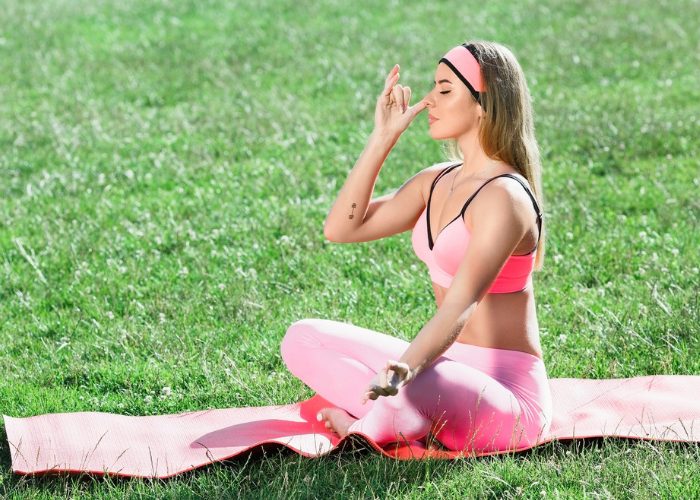
Kriya
Similar to an asana, which you would find in a regular yoga practice, a kriya is a sequence of poses and movements. You will be led by a teacher who will explain to you which movements you need to use next. There will also be breathing and sound exercises that complement some of the poses. It should increase mental and physical vitality.
Meditation
Kundalini meditation helps you to bring
All of the above helps you to unleash your Kundalini energy. When you first decide to attend a class, you should make sure that you have an open mind. You may find that this type of activity is different from anything you’ve done before now. However, it might be one of the greatest ways to relax, while boosting your physical and mental health.
Who is Yogi Bhajan?
Before we learn more about the art of Kundalini yoga, there’s one man’s name you should know – Yogi Bhajan. He was the first to bring his brand of Kundalini yoga to the west, and specifically, America in 1968.[3] Bhajan started training in yoga when he was just eight years old, and by the time he was 16 and a half, his mentor, Sant Hazara Singh, declared him to be a Master of Kundalini Yoga.[4] In 1976, he became a United States citizen.
8 Yogi Bhajan Quotes to Inspire Your Kundalini Yoga Practice

During his lifetime, Bhajan taught over 8000 classes.[5] However, his teachings and ideology live on in many forms today. As an eloquent speaker, many of the most famous Yogi Bhajan quotes have also been used time and time again. You may even find that they inspire you when you first start practicing this type of yoga. Here are some of his most memorable quotes you may wish to learn.
- “When you can take a dive to the depth of Infinity, you can also understand and measure the height of Infinity.”[6]
- “Meditation is the creative control of the self where the Infinite can talk to you.”[7]
- “What is meditation? When you empty yourself and let the universe come in you.”[8]
- “Happiness is your birthright. Live it!”[9]
- “Kundalini yoga is uncoiling yourself to find your potential and your vitality and to reach for your virtues. There is nothing from outside. Try to understand that. All is in you. You are the storehouse of your totality.”[10]
- “You have to understand the purpose of life. The purpose of life is to do something which will live forever.”[11]
- “If you make your body very strong, really strong, it can fight off anything.”[12]
- “Getting up in the morning to do your sadhana does not mean you will become God. No, getting up in the morning, you will become you!”[13]
Top Benefits of Kundalini Yoga
Now that you’re comfortable with what Kundalini yoga is all about, it’s time to consider why you should try it. There are a few strong Kundalini yoga benefits that you need to understand before you get started. Since this is such a varied practice, you engage many different areas of your body and mind. Here are some of the advantages of that.
1. Improves Cognitive Function

Since such a major part of Kundalini yoga is Kundalini meditation, it’s important to consider the health benefits it has. Research published in the US National Library of Medicine found that taking part in meditation could help to improve cognitive function in participants with memory loss.[14] After taking an eight-week-long meditation course, the participants each showed improved cognitive function. The theory follows that undertaking practices that include meditation, such as Kundalini yoga, could boost your brain and memory.
2. Reduces Stress Levels
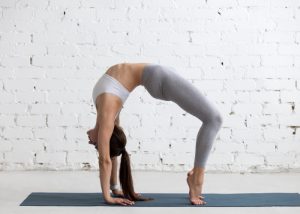
Feeling stressed out? Do you need a way to release all of that tension? You might just have found it. Research from York University suggests that engaging in yoga can help to boost your stress-beating hormones, known as cortisol.[15] That means that people who engage in practices, such as Kundalini yoga, may have lower stress levels. The research also found that this method helped participants deal with chronic pain. The results occurred after engaging in yoga twice a week over an eight-week period.
3. Boosts Energy Levels

Sometimes, we all need a little energy boost. One study from the University of Waterloo found that practicing yoga and meditation could not only help to improve brain
Kundalini Yoga Poses for Beginners
Ready to get started with some easy to learn Kundalini yoga poses for beginners? While the easiest way to learn this art form is to join a class, there are some simple poses you can try at home. Dig out your yoga mat, wear some loose fitted clothes, and try the following positions.
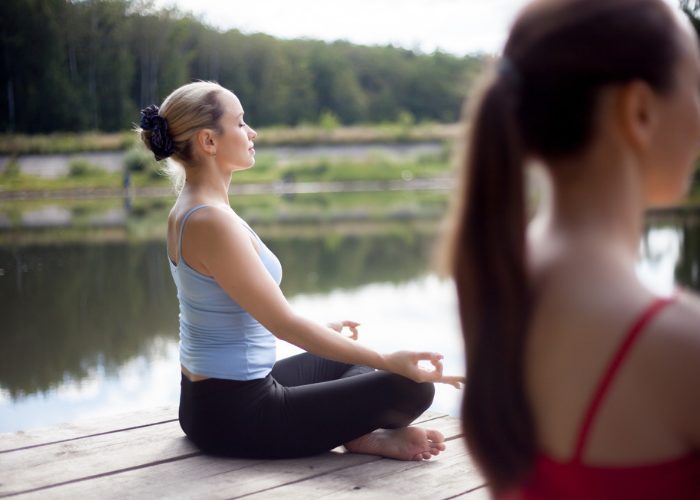
Sukhasana
The sukhasana is also known as the “easy pose” and it’s plain to see why. Start with your legs crossed (or with your feet soles touching) and your back straight. Bring your hands up to your chest and hold them in prayer position. Relax and close your eyes. You may now want to start the “tuning in” chant of “Ong Namo Guru Dev Namo.” Repeat it a few times.
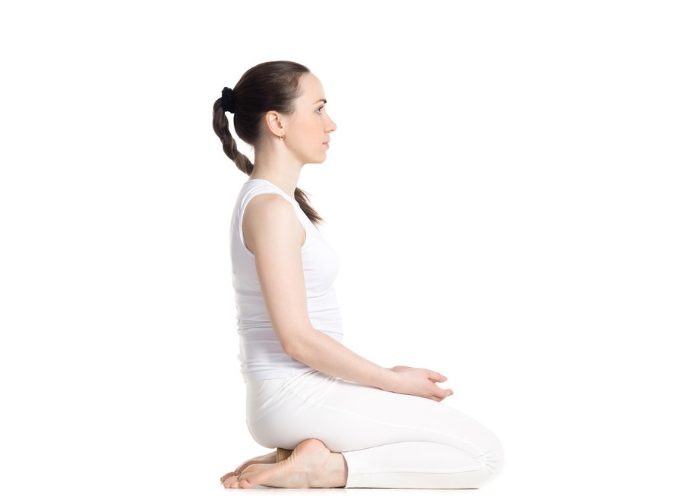
Rock Pose
Another of the easiest Kundalini yoga poses for beginners is the Rock Pose. Sit with your heels beneath your butt and your legs together. Place each of your hands on top of your thighs with your palms facing upward. Close your eyes. Roll your spine forward and then backward in a fluid motion. Repeat several times while inhaling and exhaling deeply.
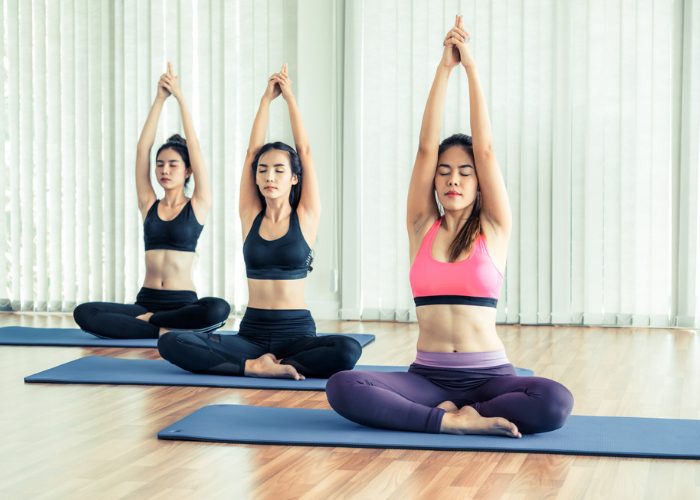
Venus Mudra
From the Rock Pose, it’s very easy to move into this next one. Stay with your feet beneath your butt and your back straight. Interlock your fingers so that you’re holding your hands together. That is called the Venus Mudra. Place them on top of your thighs. Breath in as you move your arms up above your head. Breath out as you come back down. Repeat.
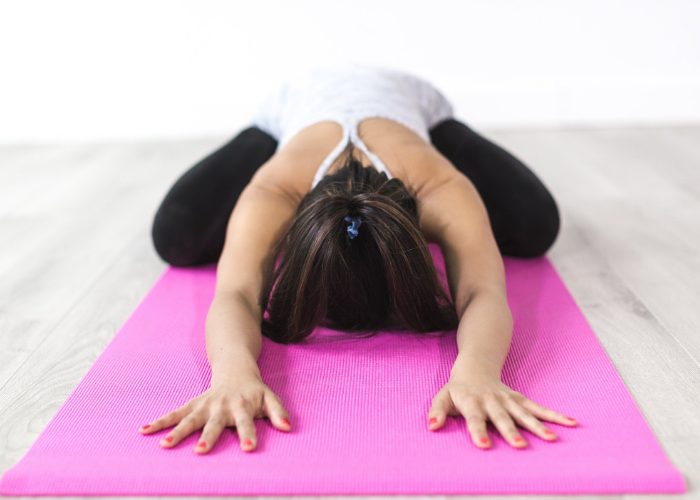
Frog Pose
This pose sounds exactly how it is – you sit down like a frog. Start in a very low squat with your legs splayed outward. Lift your heels so that your weight is on your toes and touch your fingers to the floor in front of you. Avoid arching your back and lift your head up. You can now begin to practice some deep breathing exercises or your mantras.
If you already know how to do basic yoga poses, you’ll find that many of the fundamental poses are the same as those in a Kundalini practice. This makes it the perfect new thing to try for those looking to shake up their yoga practice a bit!
Common Questions & Myths
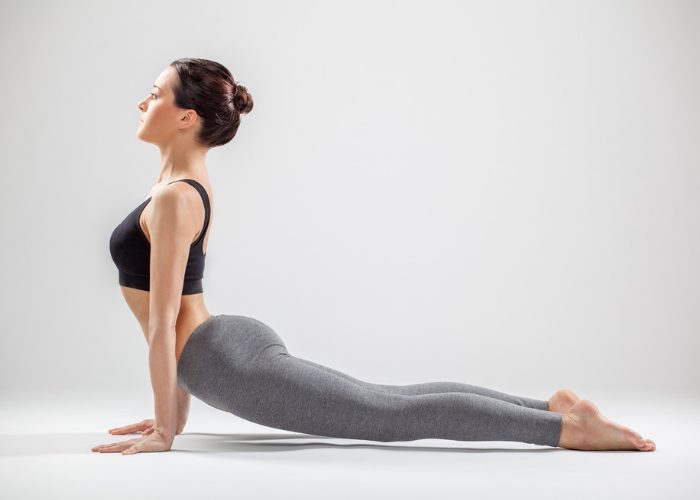
Do you have a burning question about Kundalini yoga? Let’s take a look at a few of the top myths that you may have heard about the practice and the truth of the matter.
- Is Kundalini yoga dangerous? Despite what you may have heard, Kundalini yoga is not dangerous. It is a calm, quiet practice. Make sure that you do your research and find a class near you that fits with your needs and preferences. You should always work within your own comfort level and don’t push yourself too far.
- Can Kundalini energy be too powerful to handle? One of the biggest myths you will hear when talking about Kundalini yoga is that the energy is too powerful to handle. So long as you take things at your own pace and take care, you shouldn’t have a problem. If you ever feel uncomfortable, just stop and take a break.
- Do I need special clothes to practice? You may notice than many practitioners of Kundalini yoga or meditation wear white. White has come to represent Kundalini, so many people choose to wear white clothes. But you shouldn’t feel pressured to wear it yourself! The most important consideration you should make when it comes to clothing is to wear loose-fitting clothes that you find comfortable. You need to be able to move around and follow the kriya. For example, some harem pants and an oversized t-shirt would work.

Conclusion: Tips for Mastering Your Practice
Now that you’ve got all the information you need about Kundalini yoga, let’s talk about the next steps you should take. Here are some tips that will help you master your practice:
- Research the area as much as possible
- Look for classes in your neighborhood
- Watch tutorial videos on YouTube
- Make sure that you have the right gear
- Find a yoga buddy to practice with
When you start practicing regularly, you should find that Kundalini yoga feels more and more natural. This relaxing, meditative state is one that takes time to get right. However, the more you open your mind and try to get it right, the better you will find it is.
References
- [1] https://www.Kundaliniyoga.org.uk/Kundalini-yoga
- [2] https://www.Kundaliniyoga.org.uk/Kundalini-yoga/what-to-expect-in-a-class
- [3] https://www.3ho.org/yogi-bhajan
- [4] http://www.yogibhajan.org/main
- [5] https://www.3ho.org/yogi-bhajan
- [6] https://www.3ho.org/yogi-bhajan/yogi-bhajan-quotes
- [7] https://www.3ho.org/yogi-bhajan/yogi-bhajan-quotes
- [8] https://www.lexiyoga.com/yogi-bhajan-quotes
- [9] https://www.lexiyoga.com/yogi-bhajan-quotes
- [10] https://www.3ho.org/yogi-bhajan/yogi-bhajan-quotes
- [11] https://www.lexiyoga.com/yogi-bhajan-quotes
- [12] https://www.lexiyoga.com/yogi-bhajan-quotes
- [13] https://www.3ho.org/yogi-bhajan/yogi-bhajan-quotes
- [14] https://www.ncbi.nlm.nih.gov/pubmed/20164557
- [15] https://www.dovepress.com/an-eight-week-yoga-intervention-is-associated-with-improvements-in-pai-peer-reviewed-article-JPR
- [16] https://link.springer.com/article/10.1007%2Fs12671-016-0661-2

